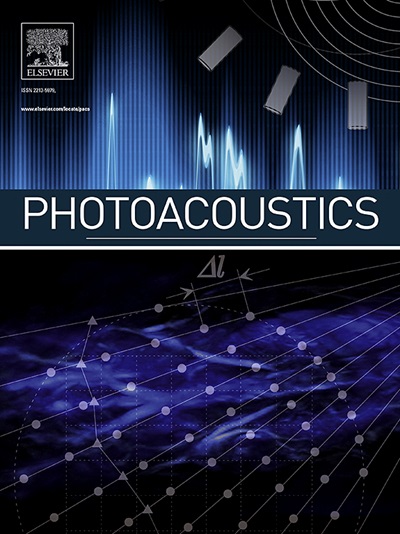基于肿瘤内和肿瘤周围 PA/US 图像的机器学习放射组学区分乳腺癌中的管腔性和非管腔性肿瘤
IF 7.1
1区 医学
Q1 ENGINEERING, BIOMEDICAL
引用次数: 0
摘要
材料与方法2022年2月至2024年4月,本研究在深圳市人民医院连续采集了322例患者,采用标准化条件对乳腺癌进行PA/US成像。使用 ITK-SNAP 划分感兴趣区,并使用 Pyradiomic 软件包中的代码自动扩展 2 毫米、4 毫米和 6 毫米的瘤周区域。随后使用 Pyradiomics 进行特征提取。研究采用了Z-score归一化、Spearman相关性特征相关性和LASSO回归进行特征选择,并通过10倍交叉验证进行验证。放射组学模型整合了瘤内和瘤周区域,并通过接收者操作特征曲线(ROC)、校准和决策曲线分析(DCA)进行了评估。整合了这些区域的综合放射组学模型显示出更高的诊断性能,尤其是 4 毫米模型的曲线下面积(AUC)最高:0.898(0.78-1.00),准确率(0.900)和灵敏度(0.937)也相当高。该模型在区分腔隙性和非腔隙性良性前列腺癌方面优于独立的临床模型和临床-放射组学联合模型,这在测试集结果中得到了证明。它证明了瘤周特征的诊断效用,减少了有创活检的需要,有助于化疗计划的制定,同时强调了优化肿瘤周围大小以提高模型准确性的重要性。本文章由计算机程序翻译,如有差异,请以英文原文为准。
Machine learning radiomics based on intra and peri tumor PA/US images distinguish between luminal and non-luminal tumors in breast cancers
Purpose
This study aimed to evaluate a radiomics model using Photoacoustic/ultrasound (PA/US) imaging at intra and peri-tumoral area to differentiate Luminal and non-Luminal breast cancer (BC) and to determine the optimal peritumoral area for accurate classification.
Materials and methods
From February 2022 to April 2024, this study continuously collected 322 patients at Shenzhen People’s Hospital, using standardized conditions for PA/US imaging of BC. Regions of interest were delineated using ITK-SNAP, with peritumoral regions of 2 mm, 4 mm, and 6 mm automatically expanded using code from the Pyradiomic package. Feature extraction was subsequently performed using Pyradiomics. The study employed Z-score normalization, Spearman correlation for feature correlation, and LASSO regression for feature selection, validated through 10-fold cross-validation. The radiomics model integrated intra and peri-tumoral area, evaluated by receiver operating characteristic curve(ROC), Calibration and Decision Curve Analysis(DCA).
Results
We extracted and selected features from intratumoral and peritumoral PA/US images regions at 2 mm, 4 mm, and 6 mm. The comprehensive radiomics model, integrating these regions, demonstrated enhanced diagnostic performance, especially the 4 mm model which showed the highest area under the curve(AUC):0.898(0.78–1.00) and comparably high accuracy (0.900) and sensitivity (0.937). This model outperformed the standalone clinical model and combined clinical-radiomics model in distinguishing between Luminal and non-Luminal BC, as evidenced in the test set results.
Conclusion
This study developed a radiomics model integrating intratumoral and peritumoral at 4 mm region PA/US model, enhancing the differentiation of Luminal from non-Luminal BC. It demonstrated the diagnostic utility of peritumoral characteristics, reducing the need for invasive biopsies and aiding chemotherapy planning, while emphasizing the importance of optimizing tumor surrounding size for improved model accuracy.
求助全文
通过发布文献求助,成功后即可免费获取论文全文。
去求助
来源期刊

Photoacoustics
Physics and Astronomy-Atomic and Molecular Physics, and Optics
CiteScore
11.40
自引率
16.50%
发文量
96
审稿时长
53 days
期刊介绍:
The open access Photoacoustics journal (PACS) aims to publish original research and review contributions in the field of photoacoustics-optoacoustics-thermoacoustics. This field utilizes acoustical and ultrasonic phenomena excited by electromagnetic radiation for the detection, visualization, and characterization of various materials and biological tissues, including living organisms.
Recent advancements in laser technologies, ultrasound detection approaches, inverse theory, and fast reconstruction algorithms have greatly supported the rapid progress in this field. The unique contrast provided by molecular absorption in photoacoustic-optoacoustic-thermoacoustic methods has allowed for addressing unmet biological and medical needs such as pre-clinical research, clinical imaging of vasculature, tissue and disease physiology, drug efficacy, surgery guidance, and therapy monitoring.
Applications of this field encompass a wide range of medical imaging and sensing applications, including cancer, vascular diseases, brain neurophysiology, ophthalmology, and diabetes. Moreover, photoacoustics-optoacoustics-thermoacoustics is a multidisciplinary field, with contributions from chemistry and nanotechnology, where novel materials such as biodegradable nanoparticles, organic dyes, targeted agents, theranostic probes, and genetically expressed markers are being actively developed.
These advanced materials have significantly improved the signal-to-noise ratio and tissue contrast in photoacoustic methods.
 求助内容:
求助内容: 应助结果提醒方式:
应助结果提醒方式:


